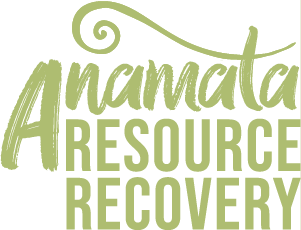Living Lightly Featuring Joss Bellerby
Introducing Joss, residing in Tryphena and owning the Stonewall Store. We appreciate Joss’ efforts in providing a wide range of bulk organic goods and her constant commitment to waste reduction in our shopping waste lifecycle.
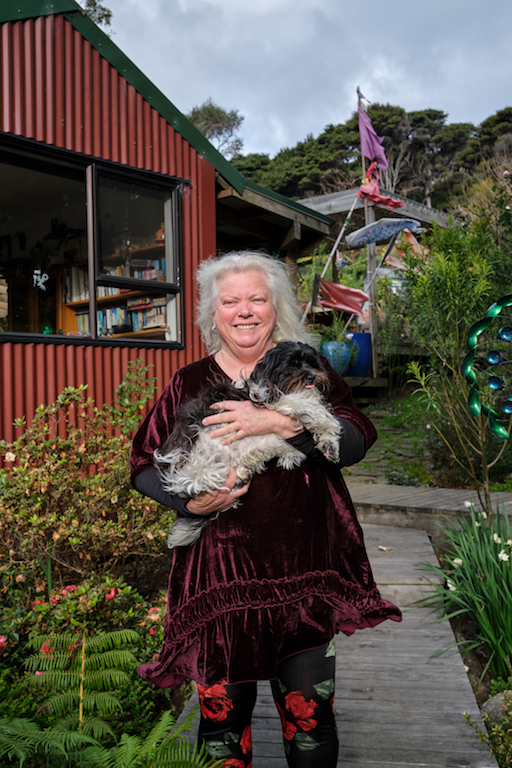
How long have you lived on Aotea? I’ve been here 40 years, since 1981.
Are you originally from the island? If not, how did you end up here?
No, I am not originally from here. I came to visit my sister, Pauline, and she convinced me to come and spend the summer here. It seemed like a good place to chill out after SA rugby protests. A summer turned into a lifetime.
When and how did your zero / minimum waste journey begin?
I have always lived remotely, it was just the way that you lived when you came. Buying in bulk and foraging, fishing & gardening. The tip was always a place to go rummage for goods – scavenging is the way of the island.
Tell us about some of the things you do that help to reduce waste, resource consumption, and sustainable living.
Conscious buying! We buy Smartass TP, which is tree free & zero carbon, it’s also great for composting toilets. We use it both at home and at the store. We’ve just also switched to using laundry strips, which are better for your waterways and for the grey water going onto your fruit trees, plus zero plastic packaging. Overall, I try not to use any products that I wouldn’t ingest myself.
I go through a thought process, thinking “do I need this or want this? And at what cost is the want going to come at?” I think you should have a “new home” for things you’re getting rid of in your house before you can get something new, and not just taking it to the Tip.
Over production and consumption is a large issue. I mean, if you can’t fit it in your house you don’t need it. Often it’s the people who consume more who create more waste.
In regards to Stonewall, the ferry takes back all the shrink wrap now, from our pallets. I take all soda stream bottles back to town with me when I go and return them. We recycle as much as we can.We have a good range of bulk bin items available, including EcoStore liquid dishwashing liquid etc.
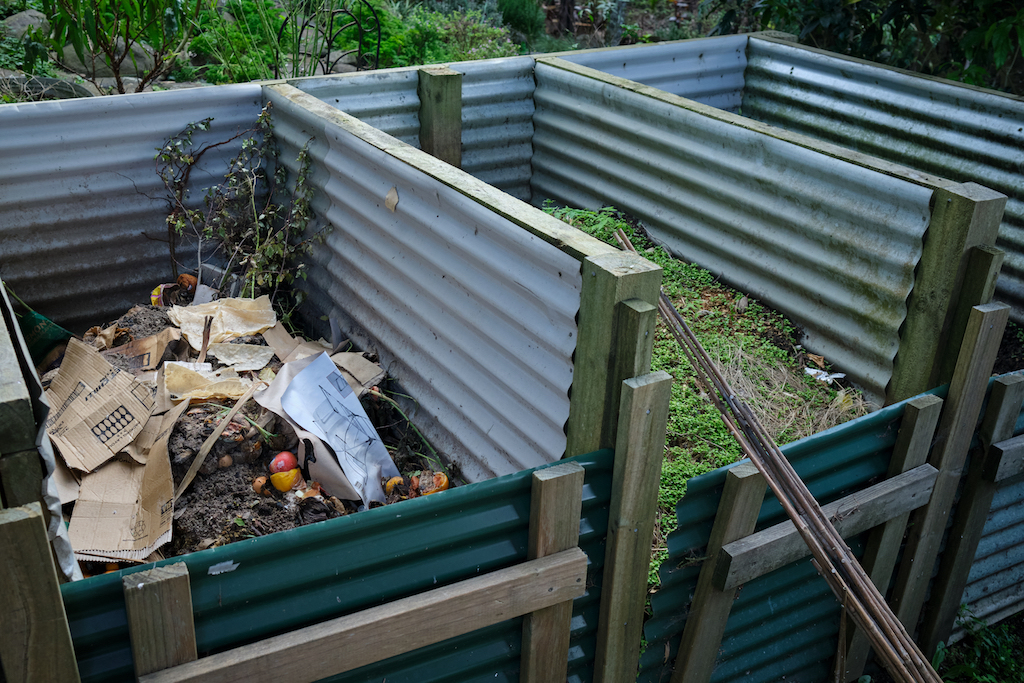
What motivates you about this lifestyle? Why is this important for you, your family and your home – specifically?
Humans take up way more space than any other species. I am just trying to do my part to care for my own environment and I try to nurture mother nature as much as she nurtures me.
Just watch Wall-E & read the Lorax! They give us all the warnings we need and paint a picture of our future if we do nothing.
Food waste is a large contributor to our waste cycle on island and country-wide. What is your policy / best practice to minimise food waste?
Packaging is a main contributor. The invention of plastic and the extensive use of it for food packaging is a huge problem. Of course, shop local! And even better, buy in bulk or from the bulk bins when you are.
My food waste cycle goes as such Joss > dogs > Cats > chickens > compost. No food waste left after that chain!
What are some of your best min waste / up-cycling tips?
I’m not sure I have any tips. I try to recycle whatever I can, I find a home for things I no longer have a use for. I choose the recyclable or compostable packaging when it’s available, but I still buy milk in plastic bottles, bread in plastic bags. Packaging needs to change at the manufacturing level.
How can people start to incorporate zero / min waste attitudes and habits into their daily life?
Once again it’s choosing to buy products that are environmentally friendly, repairing instead of buying another new item. I feel that part of the problem is that everything is made to be “disposable”. The reality is it’s cheaper to buy a new fridge than get it repaired if it breaks down and even though we can send a rocket to the moon, the goods manufactured today go ‘kaput’ faster than when they were first made and would last a lifetime. When it comes down to it the race to accumulate wealth is destroying the environment.
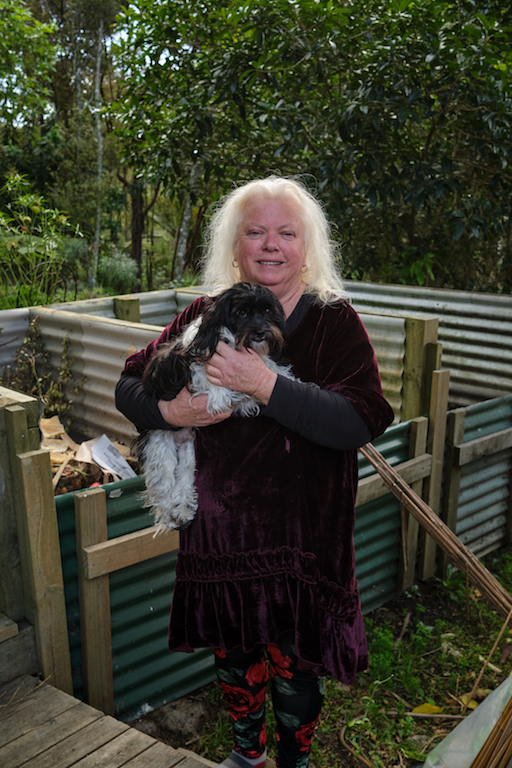
What are you most excited for in regards to the future of min waste on the island?
A bakery and a dairy farm! I would love to see these on the island, a return to the small cottage industries. Having these on island would reduce our import needs and the carbon footprint associated with freight deliveries and production.
How do you see this being adapted with the influx of people moving here? How do we get them up to speed?
People need education, especially on compost and recycling.
I think we need to look at it through the lens of ‘Why aren’t people getting the message? How do you make people give a shit? About the planet and each other? And not be greedy? To ‘trust a handshake’? That we are at a tipping point and there will be a point of no return?’
I believe the total disconnect from nature is a huge problem. We need to use messaging to connect them to the land and nature. Individual connection.
What do you hope to see on Aotea over the next 5-10 years?
I’d like to see tourism capped, to save the environment. Hopefully people will come to see nature and beauty intact and restored.
Not allowing big hotels, limiting accommodation and rental cars, keeping the same size airport. It’s not all about tourism dollars, it’s about the experience, having an affordable holiday – not to make tourism exclusive. Aotea should be for ordinary, everyday Kiwis who want to visit.
But we can’t rely on tourism alone. Tourism does help us do remodeling at the shop, but it’s not the end all be all.
We should make sure the Council is taking on the best information and providing marketing for green living

How long have you lived on Aotea? I’ve been here 40 years, since 1981.
Are you originally from the island? If not, how did you end up here?
No, I am not originally from here. I came to visit my sister, Pauline, and she convinced me to come and spend the summer here. It seemed like a good place to chill out after SA rugby protests. A summer turned into a lifetime.
When and how did your zero / minimum waste journey begin?
I have always lived remotely, it was just the way that you lived when you came. Buying in bulk and foraging, fishing & gardening. The tip was always a place to go rummage for goods – scavenging is the way of the island.
Tell us about some of the things you do that help to reduce waste, resource consumption, and sustainable living.
Conscious buying! We buy Smartass TP, which is tree free & zero carbon, it’s also great for composting toilets. We use it both at home and at the store. We’ve just also switched to using laundry strips, which are better for your waterways and for the grey water going onto your fruit trees, plus zero plastic packaging. Overall, I try not to use any products that I wouldn’t ingest myself.
I go through a thought process, thinking “do I need this or want this? And at what cost is the want going to come at?” I think you should have a “new home” for things you’re getting rid of in your house before you can get something new, and not just taking it to the Tip.
Over production and consumption is a large issue. I mean, if you can’t fit it in your house you don’t need it. Often it’s the people who consume more who create more waste.
In regards to Stonewall, the ferry takes back all the shrink wrap now, from our pallets. I take all soda stream bottles back to town with me when I go and return them. We recycle as much as we can.We have a good range of bulk bin items available, including EcoStore liquid dishwashing liquid etc.
What motivates you about this lifestyle? Why is this important for you, your family and your home – specifically?
Humans take up way more space than any other species. I am just trying to do my part to care for my own environment and I try to nurture mother nature as much as she nurtures me.
Just watch Wall-E & read the Lorax! They give us all the warnings we need and paint a picture of our future if we do nothing.
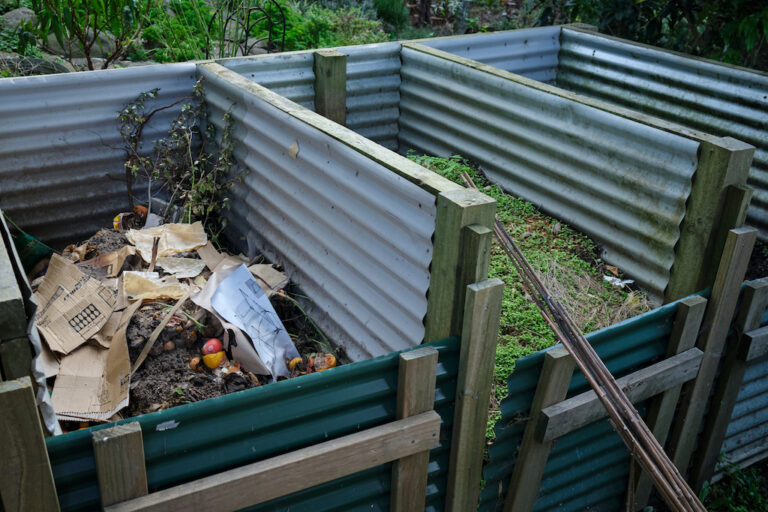
Food waste is a large contributor to our waste cycle on island and country-wide. What is your policy / best practice to minimise food waste?
Packaging is a main contributor. The invention of plastic and the extensive use of it for food packaging is a huge problem. Of course, shop local! And even better, buy in bulk or from the bulk bins when you are.
My food waste cycle goes as such Joss > dogs > Cats > chickens > compost. No food waste left after that chain!
What are some of your best min waste / up-cycling tips?
I’m not sure I have any tips. I try to recycle whatever I can, I find a home for things I no longer have a use for. I choose the recyclable or compostable packaging when it’s available, but I still buy milk in plastic bottles, bread in plastic bags. Packaging needs to change at the manufacturing level.
How can people start to incorporate zero / min waste attitudes and habits into their daily life?
Once again it’s choosing to buy products that are environmentally friendly, repairing instead of buying another new item. I feel that part of the problem is that everything is made to be “disposable”. The reality is it’s cheaper to buy a new fridge than get it repaired if it breaks down and even though we can send a rocket to the moon, the goods manufactured today go ‘kaput’ faster than when they were first made and would last a lifetime. When it comes down to it the race to accumulate wealth is destroying the environment.

What are you most excited for in regards to the future of min waste on the island?
A bakery and a dairy farm! I would love to see these on the island, a return to the small cottage industries. Having these on island would reduce our import needs and the carbon footprint associated with freight deliveries and production.
How do you see this being adapted with the influx of people moving here? How do we get them up to speed?
People need education, especially on compost and recycling.
I think we need to look at it through the lens of ‘Why aren’t people getting the message? How do you make people give a shit? About the planet and each other? And not be greedy? To ‘trust a handshake’? That we are at a tipping point and there will be a point of no return?’
I believe the total disconnect from nature is a huge problem. We need to use messaging to connect them to the land and nature. Individual connection.
What do you hope to see on Aotea over the next 5-10 years?
I’d like to see tourism capped, to save the environment. Hopefully people will come to see nature and beauty intact and restored.
Not allowing big hotels, limiting accommodation and rental cars, keeping the same size airport. It’s not all about tourism dollars, it’s about the experience, having an affordable holiday – not to make tourism exclusive. Aotea should be for ordinary, everyday Kiwis who want to visit.
But we can’t rely on tourism alone. Tourism does help us do remodeling at the shop, but it’s not the end all be all.
We should make sure the Council is taking on the best information and providing marketing for green living

